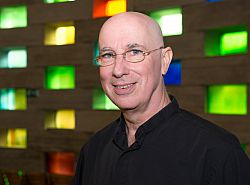Your Wellbeing: doing more by slowing down
Tomorrow (10 October) marks World Mental Health Day. To mark the occasion we’re delighted to announce a new monthly column focusing on the wellbeing of Sussex staff.
 Revd Chris McDermott, Lead Chaplain at the Meeting House
Revd Chris McDermott, Lead Chaplain at the Meeting House
I often find that my good intentions to find space – for recreation, meditation or just chilling – often get scuppered by a frenetic energy emanating from a ‘to do’ list, either written on paper or sitting in the back of my mind.
At the best of times I have found that the effort to deliberately carve out space for all or any of the above provided a healthy optic on my workload. By slowing down I find I actually ended up being more productive.
Maggie O’Neill, from Durham University, and other academic colleagues, promoting the idea of ‘the slow university’ highlight the need for ‘a socio-cultural shift’ that challenges the ethos of marketization and slows down the pace of life, work and consumption, enhances wellbeing and a healthier work/life balance.
Actually reducing workloads may not be practicable in many cases but ‘slowing down’ in this context may be as much about the attitude we have toward our ‘to do’ lists. Cultivating a capacity to step back and look at our workloads with perspective is perhaps more important than actually reducing the tasks that are set for us.
By identifying what is important to us in the bigger picture of life, work, love, etc. we achieve a more wholesome lens through which to view our work life. This stepping back is itself a slowing down. While the workload may remain as full as ever, a slower mind may actually yield more energy and increase one’s productivity.
Mindfulness – which sounds awfully like a flavour of the month these days – provides one practical tool for building inward resilience and space to approach life and work from a more grounded perspective.
Regularly taking time out to deliberately pay attention to one’s breath, body or some other object appears to have had a positive impact across various domains of wellbeing, according to some of the clinical research over the past decade or two.
Of course there is also evidence that quality recreation will equally have just as salubrious an effect on someone’s life as does mindfulness practice.
An important step toward enhancing well being is to set aside periods of time in our work diaries and honour those commitments by actually doing something recreational and so re-creating ourselves in readiness to return to whatever tasks are in our ‘to do’ lists.
You may even fill in one of those newly blank spaces in the diary by exploring mindfulness techniques that enlarge inner space and increase our stamina for engaging with work and whatever else life brings our way.
Self-compassion and giving yourself permission to step back from demanding workloads is also important here. Your productivity is not the ultimate canon that determines your worth.
The Meeting House offers mindfulness sessions several times a week and perhaps one of those slots might well fit into one of the newly blank spaces in your diary. But whether through mindful meditation or by simply taking time out for yourself you may discover you do more by slowing down.
